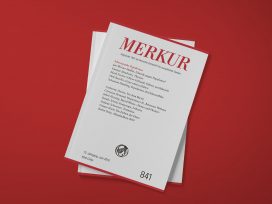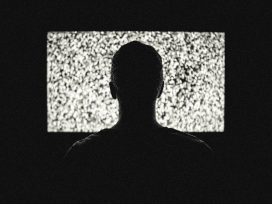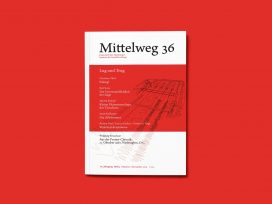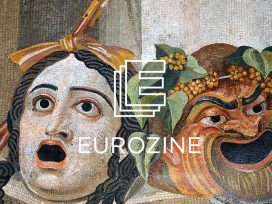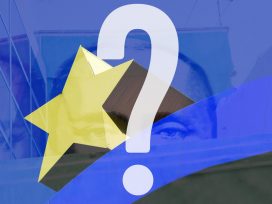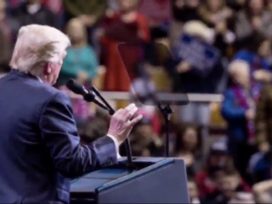In 2014, Russian historian Andrei Zubov was fired from his Moscow professorship for comparing Putin’s annexation of Crimea to Hitler’s annexation of the Sudetenland. Two years later, at a festival in the post-industrial Czech city of Ostrava, Zubov spoke to a large audience about the task of historians. ‘My dolzhni govorit’ pravdu’, he said. We should speak the truth. This declaration – all the more so when uttered in Zubov’s baritone – sounded quaint, even old-fashioned. In particular, the Slavic word pravda – truth – invoked with no qualification and no prefix, suggested a bygone era. Who believed in truth anymore?
The end of ‘The End of History’ arrived together with the end of belief in reality. The Cold War world was a world of warring ideologies; in the twenty-first century, both American capitalism and post-Soviet oligarchy employ the same public relations specialists catering to gangsters with political ambitions. As Peter Pomerantsev described in Nothing is True and Everything is Possible, in the Russia of the 2000s, distinguishing between truth and lies became passé. In this world of enlightened, postmodern people, ‘everything is PR’.
Reality television has rendered obsolete the boundary between the fictional and the real. Truth is a constraint that has been overcome; ‘post-truth’ has been declared ‘word of the year.’ In Washington, the White House shamelessly defends its ‘alternative facts’. At the beginning, American journalists were taken off-guard: they had been trained to confirm individual pieces of information, not to confront a brazen untethering from empirical reality. The New Yorker captured the desperation with a satire about the fact-checker who passed out from exhaustion after the Republican debate. He had to be hospitalized; apparently no one replaced him.
In any moment of crisis, a long Russian tradition poses two ‘eternal questions’. The first: Kto vinovat? Who is to blame? Did postmodernism’s critique of the ontological stability of truth unwillingly create the conditions of possibility for ‘post-truth’, now exploited by oligarchic regimes on both sides of the Atlantic? Is French literary theory and its ‘narcissistic obscurantism’ at fault? ‘I am no doubt not the only one who writes in order to have no face,’ wrote Michel Foucault. ‘Do not ask who I am and do not ask me to remain the same.’ Was it not always suspicious that literary theorists like Paul de Man and Hans Robert Jauss – each of whom had a vested personal interest in disassociating his youthful wartime self from his post-war scholarly self – elaborate so passionately a philosophy of the inconstancy of the I, the nonexistence of a stable subject, stable meaning, stable truth? Does Jacques Derrida not bear some responsibility for Vladimir Putin?
The second eternal question: Chto delat’? What is to be done? Is there an antidote to postmodernity? If so, where can we search for it?
‘Postmodernity’ has a history. It came not from nowhere, but rather from ‘modernity,’ which in Europe historians have traditionally dated from the eighteenth-century French Enlightenment. In the beginning, God was merely sidelined, relegated to a minor role as human reason took centre stage. ‘Sapere Aude! “Have courage to use your own understanding!” – that is the motto of enlightenment,’ Immanuel Kant famously wrote. Later (in the 1880s, to be precise), God was killed off entirely (speculatively by Dostoevsky, definitively by Nietzsche). Now the philosophical stakes of compensating for an emasculated-turned-nonexistent God became still greater. God had fulfilled epistemological, ontological and ethical roles; his death left an enormous empty space. Much of modern philosophy can be described as an attempt to replace God, to find a path to absolute truth in God’s absence.
The search for a path to truth was the search for a bridge: from subject to object, inner to outer, consciousness to world, thought to Being. Epistemology (the study of knowledge, of the possibility of knowledge) now came to dominate philosophical inquiry. Before all else, we needed epistemological clarity, certainty that we could know the world. Otherwise we were doomed to alienation. Hannah Arendt described the ‘melancholy of modern philosophy’ in the absence of anything or anyone who could guarantee the congruity of thought and Being. She blamed Kant (whom she loved) for shattering this classical identity of consciousness and world and so leaving us with nothing to hold onto. Hegel’s philosophy, in turn, was a response to Kant, an attempt to restore this broken unity. The Polish philosopher Leszek Kołakowski and the Hungarian philosopher Agnes Heller both characterized the story Hegel told in The Phenomenology of Spirit as a Bildungsroman of consciousness: we move dialectically through history towards a telos that promises ultimate reconciliation: between subject and object, consciousness and world, thought and Being. Yet no one could be sure – Arendt wrote – whether Hegel’s attempt to ‘reconstitute a world now shattered into pieces’ leaves us with ‘a residence or a prison for reality.’
There was yet another aspect of the problem: in European modernity, truth was not only difficult to reach, but also increasingly vulnerable to politics. Arendt clarified that it was not all truth that was so vulnerable to politics, but in particular ‘factual truth’. This she distinguished from ‘philosophical truth’, which can be understood as truth we can arrive at a priori, by using our own reason, a truth not dependent upon experience: 2+2=4, for instance, or Kant’s categorical imperative that a person should always be treated as an end, not as a means. What is vulnerable to politics is factual truth – a posteriori, empirical truth, truth dependent upon experience. For factual truth always bears the weakness of its original contingency. Two plus two must always, necessarily equal 4, but it was not necessary that Germany invade Belgium in 1914. Events could have played themselves out differently. The German invasion of Belgium is a fact a posteriori. (For Kołakowski, it was precisely this original, infinite contingency of empirical reality that we found existentially unbearable: the lack of a higher imperative for things happening as they do.)
While politics had always posed a threat to factual truth – Arendt explained – the pre-modern, ‘traditional lie’ had been modest in comparison to the ‘modern political lie’. The traditional lie had two distinguishing qualities: first, it ‘was never meant to deceive literally everybody; it was directed at the enemy and was meant to deceive only him’. And so the truth always found a last refuge, if only within the liar, who was aware he was lying. Secondly, the traditional lie ‘concerned only particulars … [and] a falsehood that makes no attempt to change the whole context – tears, as it were, a hole in the fabric of factuality. As every historian knows, one can spot a lie by noticing incongruities, holes, or the junctures of patched-up places.’
The modern lie, in contrast, allowed no last refuge for the truth, since the liar deceived himself as well. Moreover, the modern lie was no longer a tear in the fabric of reality. ‘Modern political lies are so big that they require a complete rearrangement of the whole factual texture,’ Arendt wrote, ‘the making of another reality, as it were, into which they will fit without seam, crack, or fissure.’ In this new reality there was no tear to perceive. This is one way to understand twentieth century totalitarian ideologies: seamless reconstructions of reality. They offered a grand narrative, a story that might be false, but nonetheless possessed its own narrative arc. They offered a transcendental key to our history and our lives, making them into a seamless, coherent whole.
The ideologies that made possible totalitarianism did not last forever. (‘Bolshevism,’ writes Yuri Slezkine in his epic-length saga of the Bolshevik elite, ‘was a one-generational phenomenon’.) By destroying the would-be experiment of ‘socialism with a human face,’ the Warsaw Pact invasion of Prague brought about the beginning of the end of the last of the grand narratives. In or around 1968, Marxism lost its hold. And there was nothing commensurate in scope to take its place. ‘I define postmodern as incredulity towards meta-narratives,’ wrote the French philosopher Jean-François Lyotard a decade later. Postmodern philosophy was in large part inspired by the moral desire never again to fall prey to those grand narratives, to those seamless reconstructions of reality that enabled totalitarianism. If modernity was the attempt to replace God, postmodernity began when we gave up on replacing God, when we accepted that there was neither a God nor a viable surrogate.
Karl Marx was untimely when he wrote that ‘all that is solid melts into air’. In the mid-nineteenth century, the observation was premature. Only in the late twentieth century did all that was solid melt. Modernity, explained the Polish philosopher Zygmunt Bauman, aspired to replace the pre-modern solids with something still more solid and lasting. Postmodernity (which Bauman calls ‘liquid modernity’) aspires to melt the solids. This second-wave modernity no longer searches for firm grounding, but embraces ephemerality, slipperiness, uncertainty, liquidity. ‘Flexibility,’ Bauman wrote, ‘has replaced solidity as the ideal condition to be pursued of things and affairs.’ All the while, God remains on His ‘protracted leave of absence.’
What is so seductive about postmodern theory – as the historian Tony Judt put it – is precisely its ‘insistence upon subverting not just old certainties but the very possibility of certainty itself.’ Now we give up on ever finding that bridge from subject to object, inner to outer, thought to Being. We relinquish the idea that there is a holistic order tying the particular to the universal, a stable structure connecting our individual selves to the world. Structures – the French philosopher Jacques Derrida told us – need a centre, a grounding point, be it God or some substitute, a way to limit the otherwise endless play of signifiers and the things they signify. ‘There has to be a transcendental signified,’ Derrida argued, ‘for the difference between signifier and signified to be somewhere absolute and irreducible.’ But this centre – this ‘transcendental signified’ – is precisely what is missing, what does not and cannot exist. The implication is both destabilizing and liberating. ‘The absence of the transcendental signified,’ wrote Derrida in the founding text of deconstruction, ‘extends the domain and play of signification infinitely’.
For Derrida, ‘play’ suggested openness, an embracing of plurality. Because there is no centre, no God and no ersatz God holding the structure of the world in place, words, meanings, truths, texts, all subvert themselves, always contain within themselves elements in tension with one another, negating one another. Meaning is never self-identical, but rather always fluid and in flux, incomplete and self-undermining, both different and deferred, other than what it had been a moment before and still to come. The relationship between words and things is not fixed; words are always already at play with one another, and so there can be no once-and-for-all determinate truth. Life is not a closed structure. There are no closed structures; life is constant movement.
And this is important: for Derrida, the very existence of a ‘transcendental signified’ was always already a totalitarian threat. Its absence is salutary, even joyous. It is an absence that leaves us not with a deficit of meaning and truth, but rather with a surplus. For Derrida the word ‘play’ was not meant to trivialize our lives and our relationship to the world. On the contrary, ‘play’ was an affirmation of our creativity, our freedom and our responsibility. Derrida’s deconstruction – the paradigmatic postmodern philosophy – was meant not as fatalistic nihilism but as provocative exhilaration. A refusal of all claims to absolute truth was meant to protect us from totalitarian terror. Deconstruction, Derrida insisted, had always represented ‘the least necessary condition for identifying and combating the totalitarian risk’.
Yet this fluidity, this openness to infinite possibilities, is also an unhinging, leaving us with no secure ground, a condition Arendt calls Bodenlosigkeit. For if there is no determinate truth, if reality is only constructed by discourse, composed of signifiers always at play with one another, does any reality exist at all that we should feel attached to, invest in, depend upon, care deeply about? Bauman argues that ‘numerous authorities’ is an oxymoron; effectively it means ‘no authority.’ Are infinite meanings and infinite truths effectively equivalent to no meaning and no truth? After the death of faith in Marxism, eastern European thinkers living under a communism no one believed in any longer, very much feared nihilism. They feared what the Czech dissident Václav Havel described to his wife, Olga, as ‘nothingness, that modern face of the devil.’
Havel wrote that letter to Olga in March 1981, from prison. He had found himself there some time after taking on the role of spokesperson for the human rights petition Charter 77. Among the other two original spokespersons was the revered Jan Patočka, older than Havel by more than a quarter-century. Patočka and Derrida had come from the very same German philosophical tradition: Hegel’s Bildungsroman of consciousness, Husserl’s phenomenology, Heidegger’s existentialism. In the 1930s, Patočka had studied with both Husserl and Heidegger; he was among Husserl’s last students. In 1949, at Charles University in Prague, he had taught a seminal lecture course on Hegel’s Phenomenology of Spirit; he had also translated Hegel’s entire text into Czech. The aging Czech philosopher had always avoided politics; he was neither a communist nor a dissident; he was a scholar and a thinker who, after being cast out of the university in the aftermath of the 1968 invasion, had been leading underground seminars in private apartments, reading Heidegger’s Being and Time with his students time and again, grappling with the meaning of each sentence, translating aloud from German into Czech as they read. Now Patočka agreed to join Havel in representing Charter 77. Within a few days the secret police came for them both. Patočka’s health was weak; he did not survive the interrogations.
Some year and a half later, an underground courier delivered to Adam Michnik, then the editor of a Polish samizdat journal, Havel’s essay dedicated to Patočka in memoriam. This essay, titled ‘The Power of the Powerless’, would become the iconic text of eastern European dissent. The anti-hero of ‘The Power of the Powerless’ is an ordinary greengrocer, who every morning dutifully hangs the sign saying ‘Workers of the world unite!’ in his shop window. The greengrocer has no special enthusiasm for communist ideals – by the late 1970s, no one does. And everyone who sees the sign understands that no one is any longer anticipating that workers around the world will unite. Yet the greengrocer, like all the others, goes on hanging the sign. After all, does he have a choice? If he were to refuse, he could be questioned, detained, persecuted. His family, too, would likely suffer. His children could be denied entrance to the university. The greengrocer, Havel tells us (although he does not use the French term), is living in mauvaise foi. He is living in ‘bad faith’, precisely in Sartre’s sense of bad faith as self-deception. The greengrocer is lying to himself – not, though, about his belief in communism. He knows perfectly well that he does not believe in communism. No, the greengrocer is lying to himself about his powerlessness.
In what way is this sense of powerlessness a self-deception? Havel responded with a question: why would all these unpleasant consequences befall the greengrocer if he were to take down the sign? After all, no one believes the sign’s message anyway. Everyone – including the emperor himself – knows that the emperor is naked. Yet these unpleasant consequences suggest that the hanging of this sign is nonetheless extremely important to the communist regime. In fact, if one day all the greengrocers were to take down their signs, this would be the beginning of a revolution. And so the greengrocer is not so powerlessness after all. On the contrary, he is quite powerful: it is the greengrocers who allow the game to go on in the first place.
Havel accused the greengrocer of ‘living a lie.’ The greengrocer’s failure to live in truth is a moral failure: he is guilty of sustaining the very system that oppresses him. That he lives a lie, that everyone lives a lie, does not make truth go away – Havel insisted – but only demoralizes the person who lives an inauthentic life. Havel’s assertion resists the postmodernist turn: no amount of propaganda or blind ritual or ‘bad faith’ can dissolve the ontologically real distinction between truth and lies.
It is not by chance that eastern European dissidents so often spoke about truth as if it were something tangible, solid like the keys in a pocket. Havel was not alone in the conviction that the ontological reality of truth was proven by the experience of the ontological reality of lies. In centring a philosophy of dissent around the distinction between truth and lies, eastern European dissidents drew not only upon the philosophical references of Central Europe, but also upon a rich tradition of Russian literature. After 1968, the communist regime resembled Dostoevsky’s Grand Inquisitor who had only one secret: he did not believe in God. For Dostoevsky, Chekhov, Gogol, Tolstoy and others, to take pen to paper was to search for the truth of human existence. In the wake of the Stalinist Terror, the Russian philosopher Nikolai Berdyaev wrote an essay titled ‘The Paradox of the Lie.’ The lie was the condition that allowed totalitarianism to come into being, asserted Berdyaev. In his experience, this lie was an expression of the deep deformation of human consciousness; as a result of this deformation, individual conscience fled ever more from the world.
A Solidarity-era Polish film – itself a contribution to the philosophy of dissent – illuminates an essential difference between modern communist totalitarianism and Putin’s postmodern Russia. In Interrogation (Przesłuchanie, 1982), set inside a Stalinist prison, the great Polish actress Krystyna Janda plays Tonia, a young nightclub singer who is suddenly imprisoned, accused of aiding enemies of People’s Poland. Her interrogators insist that she is the lover of an anti-communist spy. Tonia is uncomprehending; the interrogators’ story is fiction, she denies all of it. The interrogations continue; the prison guards torture her. Over time Tonia’s resistance breaks; gradually she acquiesces to ever greater portions of the fictitious narrative.
At the end of the film, we never learn what the true story is, which of these men appearing in the narratives of the Stalinist interrogators might have been Tonia’s lover, whether any of them had been a spy, and whether, if so, Tonia had been aware of this. And yet – we are made to understand – there is a true story. That we do not learn what it is, does not mean it does not exist. In other words, at the end of the film, there is epistemological confusion, but not ontological confusion. Truth continues to have a stable existence whether or not an individual has access to knowledge about it.
Interrogation represents the modernist position: God is dead, but that does not mean that truth, even under a totalitarian regime, is a mere subjective illusion. The postmodern world begins when we move from epistemological uncertainty to ontological uncertainty. This is when we give up on believing that there is such a thing as a stable reality beneath or amidst the created narratives. ‘Post-truth’ represents the postmodernist position: ‘you have your facts – we have alternative facts.’ ‘Everything is PR.’ Now we inhabit a seemingly infinite number of seamless alternative realities, each with its own ‘alternative facts.’ Pomerantsev describes Putin’s Russia as a world in which nothing is true – and everyone takes this lightly. In a review of Nothing is True and Everything is Possible, the Ukrainian essayist Jurko Prochasko describes truth as a limit, as a boundary and a border. To fail to recognize truth is to fail to recognize boundaries. This non-recognition, Prochasko writes, ‘never ends well’.
Derrida himself believed in hospitality, in friendship, in forgiveness. He was not a moral nihilist. Yet today, ideas that originated in the critical sensibility of the Left have been reconfigured as weapons of the Right. The philosophy Derrida conceived as an embracing of responsibility has been appropriated as an abdication of responsibility. From the point of view of intellectual history, there is a certain irony in post-factuality’s moving from East to West, from Moscow to Washington. Here Derrida himself provides a suggestion: among his favourite concepts is pharmakos, an ancient Greek word that can be used to mean both poison and remedy. Today eastern Europe could reveal itself as the pharmakos: the source of the poison could be the source of the antidote.
Kto vinovat? Who is to blame? ‘Blaming is irresponsible’, Agnes Heller answers, ‘It is responsibility that should be taken. It is responsibility that must be taken.’ In eastern Europe, the philosophy of dissent was a philosophy of responsibility. ‘Patočka used to say,’ Havel wrote in ‘The Power of the Powerless’, ‘that the most interesting thing about responsibility is that we carry it with us everywhere. That means that responsibility is ours, that we must accept it and grasp it here, now.’ ‘Life and history,’ wrote the Polish philosopher Krzysztof Michalski, one of Patočka’s last students, ‘do not go on independently of our participation, like a carousel you can ride or jump off of at will.’ Man – he argued – ‘can be identified only as the subject of history’.
Chto delat’? What is to be done? Patočka insisted that even if there were no reified, stable meaning out there to be found, the seeking of meaning was our responsibility. ‘Humans cannot live without meaning,’ he wrote. Perhaps the truth could not be had, but it could and must be sought. Kołakowski, too, was deeply committed to this position. ‘Husserl believed that the search for certitude was constitutive of European culture and that giving up this search would amount to destroying that culture,’ Kołakowski wrote. ‘Husserl was probably right.’ Kołakowski believed that the failure of Husserl’s passionate search for absolute truth was inevitable: ‘The problem of the bridge is insoluble; there is no logical passage.’ No less so, though, was it our responsibility to keep searching. To give up on truth was to give up on ethics.
In 2008, during one of their last conversations, Adam Michnik asked Havel: ‘What advice would you have for a young person today who were to ask you: how should I live?’
‘The fundamental imperative,’ Havel answered. ‘Live in truth.’
This article is co-published with Public Seminar.
